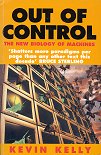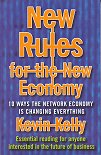As machines become more complex, they become more life-like.
We have the choice of a small number of large machines, or a large number of small machines: 'swarm' systems. The advantages of swarm systems is that they are adaptable, evolvable, resilient, boundless, full of novelty. But, they are non-optimal (they have multiple goals, and can only 'satifice', not optimise, all of them), non-controllable, non-predictable, non-understandable, non-immediate (they need to be 'grown', not 'switched on'): they are out of control.
Kelly describes swarm systems, and how we must give up our desire for control in order to reap their benefits. He does this in a dense book that covers artificial life, Biosphere II, complexity, distributed control, electronic money, emergent properties, evolution, feedback loops, hypertext authoring, navigating the Library of Babel, prairies, simulation, subsumption architectures, and more. He weaves a vast number of small threads into a lush, fascinating, mat of his view of the future: biological life and machine life converging.
Often books written by journalists, although fascinating and fun to read, are simply 'biographies' of an exciting area of research. But Kelly has a thesis, and uses interviews, quotes, and bits of history to build up and explore his thesis. This is no mere biography, this is synthesis.
If you are the sort of person who underlines or highlights important passages [shudder], don't bother: you'll have to mark the entire text.


